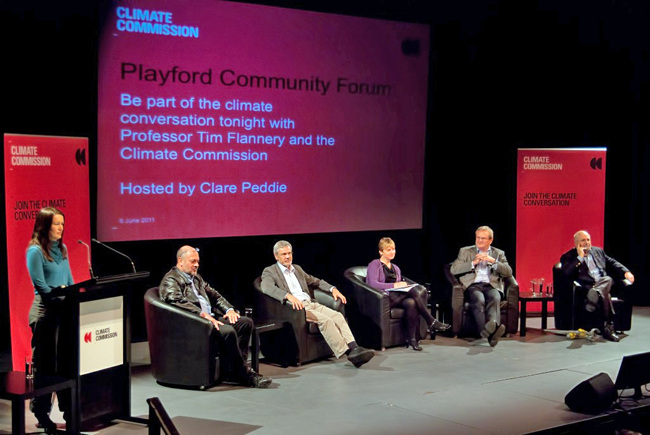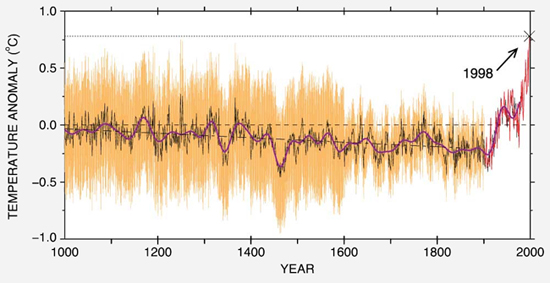The tendency of some politicians to seek to denigrate scientists and their work threatens our prospects of dealing with future change. [30 August 2011 | Peter Boyer]

At a recent public forum in Adelaide, science journalist Clare Peddie introduces Climate Commissioners (l to r) Tim Flannery (chair), Will Steffen, Susannah Eliott, Gerry Hueston and Roger Beale
Last week Julia Gillard’s chief climate science adviser, Professor Will Steffen, crossed Bass Strait to talk to the citizens of Hobart and some senior public servants about why we should be serious about reducing carbon emissions.
In a packed university lecture hall, Steffen talked about “surviving the Anthropocene” — a term that’s coming into use among scientists to describe a new era in the Earth record, around two centuries old, in which we humans are the dominant agents of change.
His compelling evidence for this development in Earth’s history included startling parallels between big shifts in numerous human activities and stresses in the natural environment.
Of the many ways we’ve influenced our planet, says Steffen, the burning of fossil fuels is most problematic. Resulting carbon pollution at a rate unprecedented in human history has consequences that will be with us for many thousands of years.
Climate change minister Cassy O’Connor made the most of his visit. The next day she had him speak to a select group of senior public servants. I’d love to have been there. For years I’ve been trying to get the ear of such movers and shakers, without success. I gather they’re very busy people.
All good, I say. Steffen has been scrutinising Earth’s climate and life systems for decades, and has an enviable international reputation for his insights into the way our planet works. His advice to policy-makers on the science behind climate and energy is to be welcomed.
But scientists can pay a price for getting involved in public affairs. Steffen’s reticence came to the surface in response to questions suggesting that scientists should be assessing the viability of political parties’ emission-reduction plans and the credibility of their supporting data.
Politics is for politicians, he told his audience. It’s his role to tell it as it is, honestly and objectively, not to advise on the efficacy of this or that policy. What governments and oppositions do with scientific information is their business.
This is where things get sticky. Yes, it’s the right of any elected representative to choose what to believe and what to reject. But when some of these politicians choose to misrepresent scientific findings, we need scientists to feel they can respond to such slurs without fear of recrimination.
It’s worth looking at the experience of scientists in the United States, which in recent years has shown the world that when it comes to debating climate policy, there’s no limit to political stupidity or chicanery — especially when it’s fuelled by money from big business.

The “hockey-stick” graph showing Northern Hemisphere temperatures through the millennium since AD 1000, as published in the 1998 paper by Mann, Bradley and Hughes. The jagged red lines on the right represent the 20th century instrumental record. Growth rings of trees are the data source for the black and orange lines. The thick purple line is a 40-year smoothing.
In 1998, a research paper by climatologists Michael Mann, Ray Bradley and Malcolm Hughes produced compelling evidence that the global mean temperature in the 1990s was higher than it had been for 1000 years. The paper became known for a temperature graph shaped like a hockey stick (left).
In 2005 non-specialist “sceptics” accused the trio of manipulating data and of being in the pocket of environmentalists. Ignoring a National Academy of Sciences endorsement of the scientists’ methods and conclusions, political critics then sought to have their “errors” put into the records of Congress.
Last year, in the lead-up to debate on an emissions trading bill, Senator James Inhofe called for the Obama administration to instigate criminal action against 17 eminent US and British climate scientists, including Mann, Bradley and Hughes, for what he called “the greatest scientific scandal of our generation”.
Obama ignored Inhofe’s utterly baseless assertion, but it may have been a factor in persuading him and his congressional allies to abandon climate legislation. Fierce attacks on anyone who dares to assert that humans are contributing to climate change are making US climate scientists nervous.
Canberra isn’t Washington, but sometimes I think it’s doing its best to get there. There is ill-disguised aggression in the Opposition campaign to de-rail climate measures.
It hasn’t stopped Steffen and his fellow Climate Commissioner Tim Flannery from meeting with the Opposition’s climate spokesman, Greg Hunt. As Steffen tells it, Hunt gave them a sympathetic hearing. It’s a pity the same can’t be said of some of his parliamentary colleagues.
Tony Abbott’s actions speak louder than his assurances that he no longer thinks climate science is “absolute crap”. Canberra’s climate “debate” has degenerated from a tolerably bipartisan situation in 2009 to today’s savagely partisan one, where reasoned argument has given way to bullying and character assassination.
If the rule of law is a cornerstone of our civilisation, science would have to be another one. We need Will Steffen and all his professional colleagues to redouble their efforts to illuminate the workings of Planet Earth. Our legitimate right to criticise their findings is not a licence to intimidate.
We need science to be involved in all aspects of building a sustainable future. Besides observing, analysing and modelling climate, we need its intellectual grunt to help us account for carbon stocks and flows, evaluate policy options, and devise new ways of generating or conserving energy.
Our scientists need to feel confident about discussing their work freely and publicly without setting off a political vendetta seeking to trash their reputations. Is that too much to ask?
